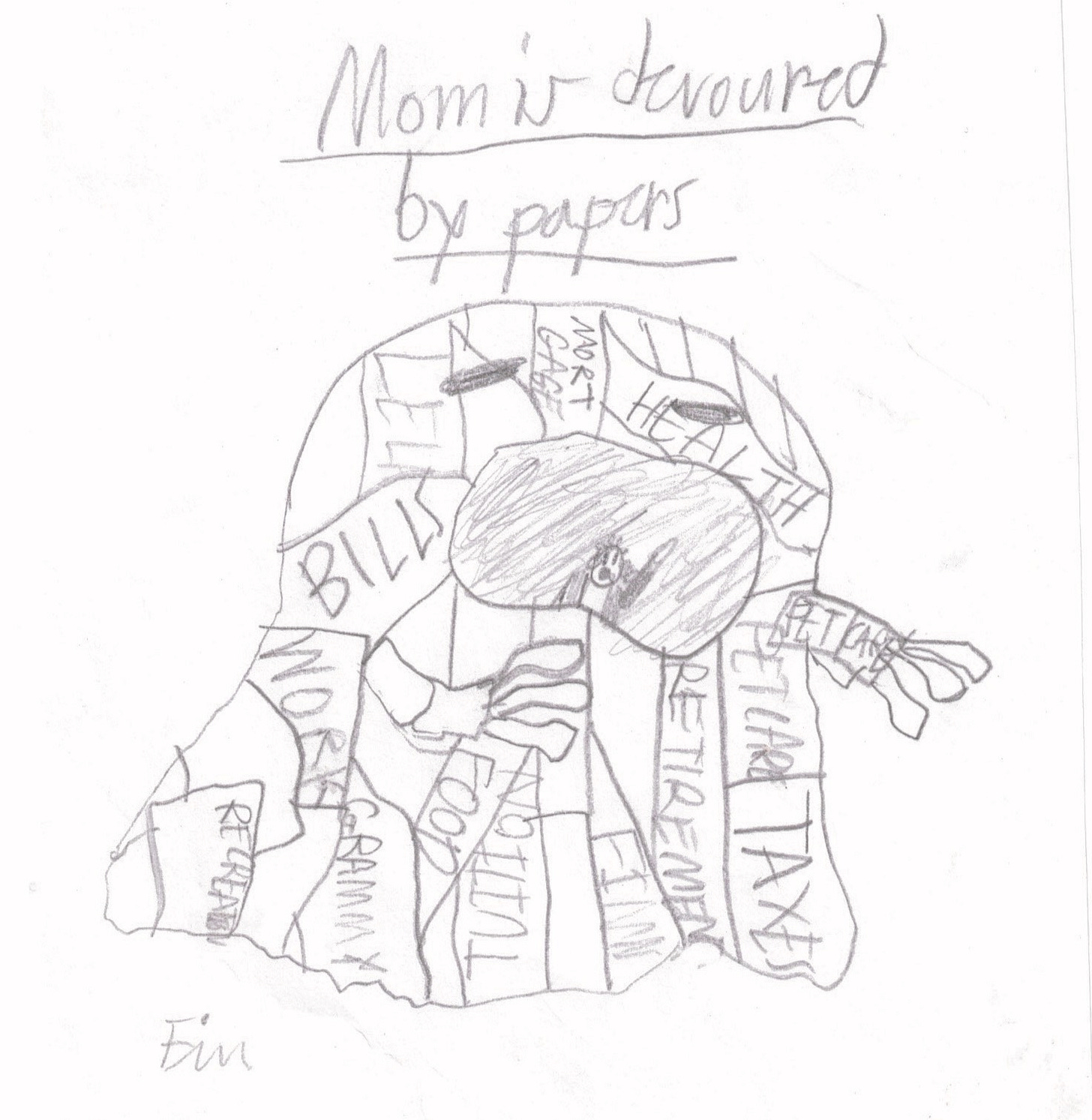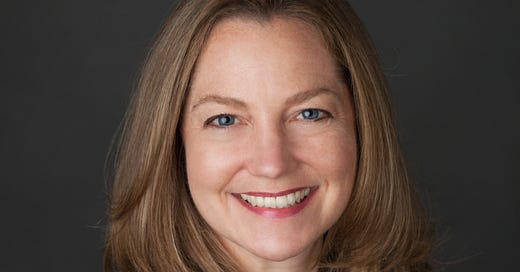"Quarantine has led to a decluttering boom"
A pro organizer's take on a year of pandemic life at home
It has been a year. That’s a long time to be hunkered down in the same place with the same stuff. As someone with an abiding interest in humans’ material lives, I’ve been wondering: How has a year of pandemic living changed the way people feel about their things? Are we all maximalists now?
I decided to ask an expert: Heather Cocozza, the founder of Cocozza Organizing + Design LLC, a boutique firm in the DC area that works with individual, corporate, and institutional clients. Heather serves on the board of the National Association of Productivity and Organizing Professionals (NAPO), and she’s a Certified Professional Organizer (CPO®).
When I was working on CLUTTER: AN UNTIDY HISTORY, I talked to a lot of people on the front lines: first responders, junk haulers, and pro organizers like Heather. She was a key source, generous with her expertise and experience. I’m grateful to her for that and for making time for this Q&A, which we did via email in early March 2021.
Read on for Heather’s insights on how decluttering and organizing can be a help in tough times, how a Zoom-ready work-from-home office is “the new business suit,” the Instagrammable vogue for ROYGBIV organizing, whether workers will ever go back to open-offices plans, and more.
JEN: Many of us have been stuck at home—living, working, and going to school in the same place—for a year now. That puts a lot of pressure on domestic spaces. Has quarantine life led to a decluttering boom, or are people too overwhelmed just trying to get through the day/week/month/year? How busy have professional organizers been in 2020-21?
HEATHER: Quarantine has led to a decluttering boom, as shown by a two-month waitlist for charity donation pickup services and the launch of many new junk-hauling companies.
Because of the pandemic, as much as people wanted to get organized, they also wanted to protect themselves and their families for not having too many people in the home. However, with the release of the Netflix series “Get Organized With The Home Edit" in August 2020, people were incredibly inspired, and professional organizers were busy again if they chose to work in homes.
Even though the pandemic is overwhelming at times, organizing can give a sense of control that can be empowering in a tough time like this. However, many professional organizing companies [in the DC area] are still not fully operational, as sections of the DMV remain in only Phase 2 Reopening.
Lastly, many professional organizers were able to still be employed through the pandemic by pivoting slightly and redirecting their services to move coordination and unpacking to support moving, as 2020 was a record-breaking year for the U.S. housing market.
“Even though the pandemic is overwhelming at times, organizing can give a sense of control that can be empowering in a tough time like this.”
JEN: What are the top three things—projects, particular spaces, categories of stuff—that clients want your help with? Has that changed over the last year?
HEATHER: The top three things, which are all a change from pre-COVID times, are move preparation/move coordination (for residential and commercial spaces), Instagrammable kitchen pantries, and downsizing/donating & selling (for residential and commercial spaces).
JEN: Even before COVID, it felt like minimalism was on the wane. Newer trends like #cottagecore and the New Maximalism celebrate having stuff rather than getting rid of it. Suddenly it's not such a bad thing to have a closetful of old craft projects and art supplies. Are we more comfortable with clutter than we used to be?
HEATHER: I will not be surprised if people go full-tilt tacky, because who cares? No one walks into our homes anymore, and after living through a pandemic, people are much less judgmental. “Decor” is what makes you happy. Did I tell you my neighbor has a blow-up inflatable unicorn and leprechaun bigger than his house currently on his front lawn? And I actually don't care.
Yes, I know people buying green sofas and going glam. Who knows, I might even maxi my office—just not the side people can see on Zoom. :)
Marie Kondo espouses the idea that if you declutter, you don’t need to organize, because it is so simple no systems are needed. I would say we’re not more comfortable with clutter but we’re not minimalists either.
Minimalism has never been a very realistic option for our clients. In wanting to provide long-lasting and effective solutions for our clients, minimalism was rarely ever the answer, then or now. A client might like the look but wouldn’t be able to keep it up. There is nothing wrong with a closet of art supplies, as long as it is organized, and you get Instagram bonus points if it is sorted in rainbow colors (ROYGBIV).
JEN: Do you think the pandemic will lead to any permanent changes in how we organize our homes and what objects we decide to keep—or to get rid of?
HEATHER: Permanent change would be work from home (WFH) space for those who's jobs remain at least partly remote. The WFH office is becoming the new business suit, so to give off a good impression to clients, you will want to keep it organized.
With regards to objects, there was A LOT of bulk buying in the beginning of the pandemic, even by professional organizers, because 1) so many thing were out of stock and 2) we were warned that the pandemic would interrupt the supply chain of getting goods, so business owners were told to stock up. It will take a long time for folks to work through the wipes, water, hand sanitizer, and masks, so these items are here to stay for a while. Establish an organized system for these pandemic products so that you know what you have.
Lastly, multi-generational housing has become a thing, along with families with pandemic-born babies becoming first time home owners moving out to the suburbs. The pandemic gave people a new appreciation for families, so I believe we will continue to help consolidate and organize multiple households into one home.
“The WFH office is becoming the new business suit, so to give off a good impression to clients, you will want to keep it organized.”
JEN: You and I have talked about digital clutter, like the thousands of family photos I keep meaning to organize. How big an issue is that for your clients? Do you spend more time on digital organization now than you used to? What's the next frontier for professional organizers?
HEATHER: The WFH model increases people's need for “digital fluency” and the management of digital files. I anticipate an increase in requests from clients to help with digital organization, because now it’s been over a year since the WHO announced the pandemic. People can sometimes keep their files organized for one year, but after that, it all starts to build up and it gets harder and harder to find their files.

JEN: You work with institutions and companies as well as with individuals. With so many employees working from home, have your business clients changed how they want or need to organize their workplaces and systems? What trends do you see emerging there?
HEATHER: Cocozza Organizing + Design has been advising clients on how to downsize, but COVID-19 has put another twist on office downsizing. The open-office concept was all the rage to increase communication and build community. One year later, we are living in a very different environment that discourages face-to-face interaction, requests six feet of social distancing, and encourages barriers.
Business owners are starting to pivot their commercial work spaces to reduce their overall office space footprint, de-densify the office space that remains, and declutter to facilitate cleaning. We have helped businesses achieve this downsizing goal COVID-19-style, through project planning, office furniture liquidation, records management, and hands-on organizing.
Even as vaccines become more widely available and the threat of COVID-19 is perhaps diminishing, many businesses are still choosing to downsize. Working from home for a year has shown them how their business might work without a traditional office and how much money they can save by doing it.
In work situations where paper files are still needed (e.g., case files, contract files), companies still have restrictions on how often and how many people can be in an office space at one time. The result of this is that paper files which are still being used need to be extremely organized, because now people need to find exactly what they need very quickly. We are still helping clients organize these files.
“The open-office concept was all the rage to increase communication and build community. One year later, we are living in a very different environment.”
JEN: What haven't I asked that you'd like to talk about?
HEATHER: Our residential clients who are seniors I think are really missing that face to face interaction in their home. Physically handling their stuff and going through it together—there is an art to it. It is somewhat intimate, and the trust has to be there.
We aim to make them feel comfortable with a task that sometimes causes anxiety or stress, and that’s a delicate task. We’ve done pretty well transitioning that to phone and Zoom, but we and our clients would both agree it’s just not the same! It will be good to develop those special kinds of relationships in person again. We miss it.
Happy pandemic decluttering, readers, if that’s your thing. And if you’re all about embracing clutter these days, I won’t judge. Keep masking up and social distancing, get vaccinated when it’s your turn, and we’ll get through this.
Cheers,
Jen
Thanks for reading. If you know somebody who would enjoy this post, why not share it?
Not a subscriber to this newsletter yet? Sign up now. It’s free!




